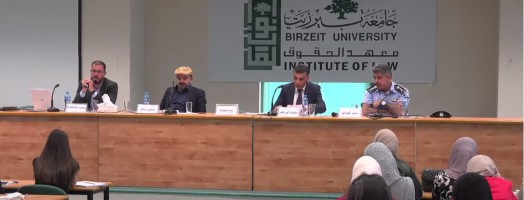Workshop at Birzeit University’s Institute of Law Explores Legal Aspects of Information Technology
Workshop at Birzeit University’s Institute of Law Explores Legal Aspects of Information Technology
Birzeit University's Institute of Law (IoL) held a workshop on Wedenesday, May 10, 2023 on "Law and Information Technology." The workshop was a key event within the IoL’s Legal Encounters programme and the Master's programme in Law and Information Technology. Its primary objective was to illuminate the intersection between technology usage and legal principles. Distinguished experts, including academics, advisors, researchers, and students actively participated in this gathering.
The workshop commenced with an opening address by Ms. Reem Al-Butmeh, Director of the Institute of Law. Al-Butmeh warmly welcomed the speakers and attendees, underscoring the workshop's significance in tackling a novel topic: the legal dimensions of technology usage. The workshop sought to delve into prominent legal issues arising from the practical application of technology, such as digital evidence, e-government services, access rights, privacy, and the freedom of digital information exchange. Ultimately, it aimed to provide a comprehensive and multi-faceted perspective on the legal challenges posed by technology in Palestine.
Facilitated by Jamil Salem, the workshop's first session centered around the criminal justice system and the role of digital evidence in electronic crimes. Attorney Sufyan Abu Zuhairah, Head of Public Prosecution: Cybercrime Prosecution Unit, shed light on accessing digital evidence in electronic crimes. He emphasized the Cybercrime Prosecution's crucial role in the investigation process and the presentation of digital evidence to the court, in accordance with existing legislation.
Mr. Samir Al-Hindi, Director of the Police Cyber-Crimes Unit, delved into the technical aspects of identifying digital evidence in electronic crimes. He highlighted the procedures for handling digital evidence and illustrated real-life cases handled by the E-Forensic Laboratory. Furthermore, he addressed the primary challenges encountered when dealing with digital evidence in Palestine.
Dr. Mohammed Khanafsa, a lecturer at the Faculty of Engineering and Information Technology at Birzeit University, discussed standard procedures for processing and preserving digital evidence. He expounded upon the fundamental rules governing the handling of such evidence and elucidated the software and technologies that facilitate its processing, preservation, and presentation. Khanafsa also delved into the main challenges and issues faced by professionals dealing with digital evidence.
Facilitated by Ahmed Hamu, the second session focused on the current landscape of e-services and e-government in Palestine. Fadi Marjaneh, General Director of e-Government at the Ministry of Telecommunications and Information Technology, discussed the Ministry's role in digital transformation. He emphasized the policy and technological aspects of implementing "My Government" for e-services and underscored its significance in expediting the provision of electronic services to all citizens. Ibrahim Al-Qadi, General Director of Consumer Protection at the Ministry of National Economy, addressed consumer protection in electronic service supply contracts in Palestine. He elaborated on the means and regulations aimed at safeguarding Palestinian consumers in their interactions with advertisements and electronic transactions.
Mr. Mohammed Khadir, a researcher at the Institute of Law, delved into the local and comparative legal framework governing e-services and e-government. He highlighted the general principles that guide the use of technology in comparative legal systems, while explaining the local legislative reality and the legal issues stemming from the absence of essential legal rules that should serve as a reference framework for technology usage, regulate its applications, and address its various facets.
The third and final session delved into digital rights in Palestine, with a particular focus on ensuring access, privacy, and the freedom of information exchange. Lawyer and journalist Ma'mar Arabi tackled the topic of digital expression freedom and content censorship in Palestine, underscoring the practical challenges related to violations of digital
Facilitated by Ola Omar, the third session, titled "Digital Rights in Palestine: Ensuring Access, Privacy, and Freedom of Information," had three speakers. Mr. Ma'mar Arabi, a distinguished lawyer and journalist at Watan Media Network, delved into the critical topic of digital expression freedom and content censorship in Palestine. His presentation shed light on the practical challenges surrounding violations of freedom of expression, unveiling the multitude of barriers and censorship faced by digital content providers and the Palestinian writers across various levels.
Following this presentation, Ms. Catherine Abu Amsha, the Director of Local Advocacy at the Arab Center for Social Media Development, focused her presentation on electronic transformation and data privacy in the Palestinian context. She outlined the legal framework for safeguarding data privacy and elucidated the emerging practical issues that arise due to the absence of regulatory laws governing data privacy and protection in the Palestinian context.
It is worth mentioning that this workshop is part of the series of legal encounters organized by the IoL at Birzeit University with support from the Konrad Adenauer Stiftung, which aims to provide an academic knowledge framework that plays a fundamental role in enhancing discussions and addressing emerging legal issues.











